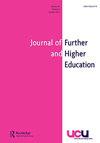普通继续教育学院:组织文化的持续困境
IF 2.4
Q1 EDUCATION & EDUCATIONAL RESEARCH
引用次数: 0
摘要
组织文化在支持组织成果方面的作用在英国的继续教育(FE)部门得到了充分的证明。强大而统一的文化的好处被认为对员工和学生有积极的影响。然而,自1993年成立以来,FE部门的大学在商业和教育需求之间存在着文化-制度的二分法。本文采用解释、解释学的方法分析了英国三所普通继续教育学院(GFEC)校长、中层领导和教师的看法,以确定这种二分法在其当前的运营环境中是否存在。论文得出结论,尽管商业和教育理想之间存在冲突,但普通继续教育学院(GFEC)的文化已经超越了企业化的叙事,完全由绩效概念驱动。这篇文章为正在进行的关于FE目的的辩论做出了贡献,并确立了将宏观文化和亚文化与GFEC内的一套专业工作实践相结合的重要性,以支持积极的学生成绩。本文章由计算机程序翻译,如有差异,请以英文原文为准。
General further education colleges: the continuing dilemma of organisational culture
The role of organisational culture in supporting organisational outcomes is well documented in the further education (FE) sector within the UK. The benefits of a strong and unifying culture are recognised as having a positive impact on staff and students. However, a cultural institutional dichotomy has been acknowledged between the business and educational needs of colleges within the FE sector since the advent of incorporation in 1993. This paper utilised an interpretive, hermeneutical approach to analyse the perceptions of principals, middle leaders and teachers, within three general further education colleges (GFECs) in England to determine if that dichotomy exists in their current operating environment. The paper concludes that while there are elements of a clash of business and education ideals, general further education college (GFEC) culture has moved beyond the narrative of being corporate and driven solely by the concept of performativity. The article contributes to the ongoing debate on FE purpose and establishes the importance of aligning macro and subcultures into a set of professional working practices within GFECs to support positive student outcomes.
求助全文
通过发布文献求助,成功后即可免费获取论文全文。
去求助
来源期刊

JOURNAL OF FURTHER AND HIGHER EDUCATION
EDUCATION & EDUCATIONAL RESEARCH-
CiteScore
5.20
自引率
4.30%
发文量
80
期刊介绍:
Journal of Further and Higher Education is an international, peer-reviewed journal publishing scholarly work that represents the whole field of post-16 education and training. The journal engages with a diverse range of topics within the field including management and administration, teacher education and training, curriculum, staff and institutional development, and teaching and learning strategies and processes. Through encouraging engagement with and around policy, contemporary pedagogic issues and professional concerns within different educational systems around the globe, Journal of Further and Higher Education is committed to promoting excellence by providing a forum for scholarly debate and evaluation. Articles that are accepted for publication probe and offer original insights in an accessible, succinct style, and debate and critique practice, research, theory. They offer informed perspectives on contextual and professional matters and critically examine the relationship between theory and practice across the spectrum of further and higher education.
 求助内容:
求助内容: 应助结果提醒方式:
应助结果提醒方式:


